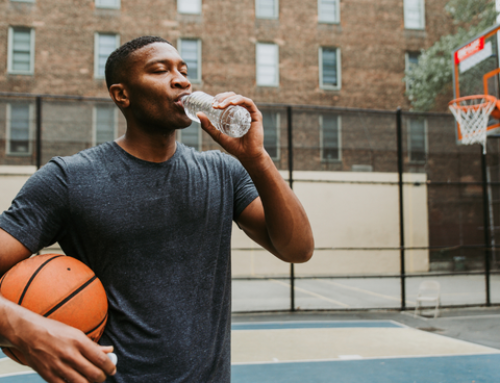Formulating a Summer Hydration Plan
We sat down with Gatorade Sports Science Institute senior scientist Dr. Kim White to drink in everything you need to know about formulating a summer hydration plan.
STACK: How much should athletes drink to stay hydrated?
White: There’s not really a magic number of ounces of fluid that an athlete needs in a day to stay hydrated. The easiest way to tell if you’re hydrated is to monitor your urine color (see below). You should also weigh yourself before and after practice, because if you lose weight over the course of a practice session, that weight is all fluid that you’re losing in your sweat. After practice, if you’ve lost weight, you should consume fluid to replace that body weight. For every pound you lose, [drink] about 20 ounces of fluid.
STACK: What types of fluids should athletes consume?
White: Water is fantastic throughout the day, but around the exercise session is when it’s really important to have a sports drink. During exercise and afterwards, it’s very important to have a beverage with electrolytes, [especially] sodium, because [it’s] the primary electrolyte lost in sweat. You lose some potassium, a bit of calcium and a little bit of magnesium; you even lose a little bit of iron in your sweat. But sodium is by far the largest mineral that’s lost in sweat. That’s why athletes who sweat a lot will often see white residue on their clothes or their skin. That’s from all the sodium that’s being lost in their sweat.
STACK: What’s the role of sodium?
White: Sodium is very important in the body for fluid balance. It helps you retain fluid and hold onto it in your blood, which is important during exercise. It helps athletes maintain the volume of their blood so that they’re remaining hydrated. If you’re losing much sodium and fluid, you are prone to cramping [and] you’re at higher risk of being dehydrated.
STACK: What are some other advantages of consuming sports drinks instead of water?
White: We know from research that when athletes have equal access to either water or a sports drink, if they like the flavor of the sports drink, they’ll choose to drink more on their own in the same exercise setting than they would water. If you like the flavor of something, you tend to drink more of it, and that will help you stay hydrated. The sports drink [also provides] carbohydrates, which is energy for the muscles and the brain.
STACK: How do fluids influence caloric intake?
White: Water doesn’t contribute to calorie intake, [nor do] beverages like tea and coffee, if nothing is added to them. But, then you have juices and milks, which are high-quality sources of calories in a diet. Sports drinks also provide calories and should be consumed around the exercise occasion.
STACK: Is there a time when water is a better option than a sports drink?
White: Not really, because sports drinks are low-calorie offerings that provide an energy benefit [as well as] electrolytes, which are really important to staying hydrated.
RECOMMENDED FOR YOU
MOST POPULAR
Formulating a Summer Hydration Plan
We sat down with Gatorade Sports Science Institute senior scientist Dr. Kim White to drink in everything you need to know about formulating a summer hydration plan.
STACK: How much should athletes drink to stay hydrated?
White: There’s not really a magic number of ounces of fluid that an athlete needs in a day to stay hydrated. The easiest way to tell if you’re hydrated is to monitor your urine color (see below). You should also weigh yourself before and after practice, because if you lose weight over the course of a practice session, that weight is all fluid that you’re losing in your sweat. After practice, if you’ve lost weight, you should consume fluid to replace that body weight. For every pound you lose, [drink] about 20 ounces of fluid.
STACK: What types of fluids should athletes consume?
White: Water is fantastic throughout the day, but around the exercise session is when it’s really important to have a sports drink. During exercise and afterwards, it’s very important to have a beverage with electrolytes, [especially] sodium, because [it’s] the primary electrolyte lost in sweat. You lose some potassium, a bit of calcium and a little bit of magnesium; you even lose a little bit of iron in your sweat. But sodium is by far the largest mineral that’s lost in sweat. That’s why athletes who sweat a lot will often see white residue on their clothes or their skin. That’s from all the sodium that’s being lost in their sweat.
STACK: What’s the role of sodium?
White: Sodium is very important in the body for fluid balance. It helps you retain fluid and hold onto it in your blood, which is important during exercise. It helps athletes maintain the volume of their blood so that they’re remaining hydrated. If you’re losing much sodium and fluid, you are prone to cramping [and] you’re at higher risk of being dehydrated.
STACK: What are some other advantages of consuming sports drinks instead of water?
White: We know from research that when athletes have equal access to either water or a sports drink, if they like the flavor of the sports drink, they’ll choose to drink more on their own in the same exercise setting than they would water. If you like the flavor of something, you tend to drink more of it, and that will help you stay hydrated. The sports drink [also provides] carbohydrates, which is energy for the muscles and the brain.
STACK: How do fluids influence caloric intake?
White: Water doesn’t contribute to calorie intake, [nor do] beverages like tea and coffee, if nothing is added to them. But, then you have juices and milks, which are high-quality sources of calories in a diet. Sports drinks also provide calories and should be consumed around the exercise occasion.
STACK: Is there a time when water is a better option than a sports drink?
White: Not really, because sports drinks are low-calorie offerings that provide an energy benefit [as well as] electrolytes, which are really important to staying hydrated.











